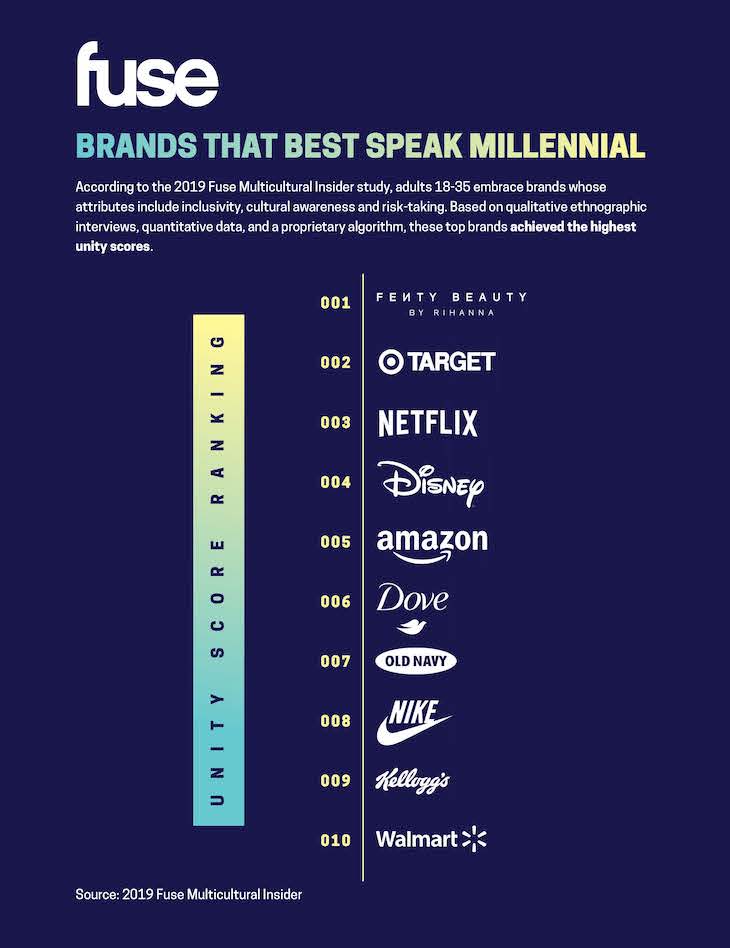Millennials highly prize unity and inclusiveness and brands who want to court that demographic should keep those values firmly in mind, finds a new study commissioned by Fuse Media.
The 2019 Fuse Multicultural Insider, commissioned by Fuse and conducted by research firm NRG, sampled 1,500 emerging adults ages 18-35 and 500 GenXers ages 36-49.
Among the study’s key findings are the fact that millennials see unity as two times more valuable than diversity and 55 percent of millennials agree that “diversity isn’t inclusive enough.” Calling millennials the “We Generation,” the study found that this demographic emphasizes human rights over individual ones.
“While respecting each other’s culture is important to this generation, their shared sensibilities and passions have deeply bonded them and encouraged them to look past these once-limiting boundaries,” said Mark McIntire, head of marketing, Fuse Media, in a statement. “Millennials understand the power of being united, and want to work together to improve the world for themselves and future generations. They also expect companies that are looking to engage with them to follow suit. We are sharing these findings with our brand and agency partners, as we help them identify the best opportunities to reach this ‘We Generation.’”
The study also found that millennials actually find brands more trustworthy than social media influencers, celebrities and the government. To maintain and improve upon that trust, the study recommended that brands make a point of appealing to many types of people; market to people based on their passions and interests, not based on what they look like: give underrepresented groups both a platform and a voice; and value inclusivity.
In equal measure, millennials surveyed said they expected their favorite brands to be both diverse while also representing them.
More than half (55 percent) of millennials look for their favorite brands to take a stand on political issues, two thirds (67 percent) find it important for them to take a stand on social issues and 67 percent also say it’s important for them to take risks. In fact, 72 percent of millennials like when brands take a clear stance on social and cultural issues (vs. 63 percent of GenXers), and 63 percent expect brands to speak out on social and cultural issues whether they agree with that stand or not (vs. 54 percent of GenXers).
All that said, though, brands have to mean it when they choose to take a stand and cannot appear like they are doing to score points. Some 85 percent of millennials surveyed agreed that “it’s obvious when brands try too hard to appear inclusive or diverse” and 84 percent agreed that “sometimes it feels like brands are just checking a box when it comes to diversity.”
Fuse Media and NRG used this research to compile what they call a “Unity Score,” which examines brands through the lens of key values sought by millennials: inclusivity, cultural awareness and risk-taking. Using that score, the 10 brands that performed the best were, in alphabetical order: Amazon, Disney, Dove, Fenty Beauty, Kellogg’s, Netflix, Nike, Old Navy, Target and Walmart.

Research for the study was conducted via a combination of cultural ethnographies to identify key trends, and a quantitative survey to acquire data. Nine thought leaders in New York, Minneapolis and Portland, along with their friends and family, also were recruited to discuss their ideas, values and perception of culture. Finally, NRG used a comprehensive online survey of 1500 young adults ages 18-35 and 500 GenXers ages 36-49.
Tags: disney fuse media millennials netflix













































__twocolumncontent.jpg)











